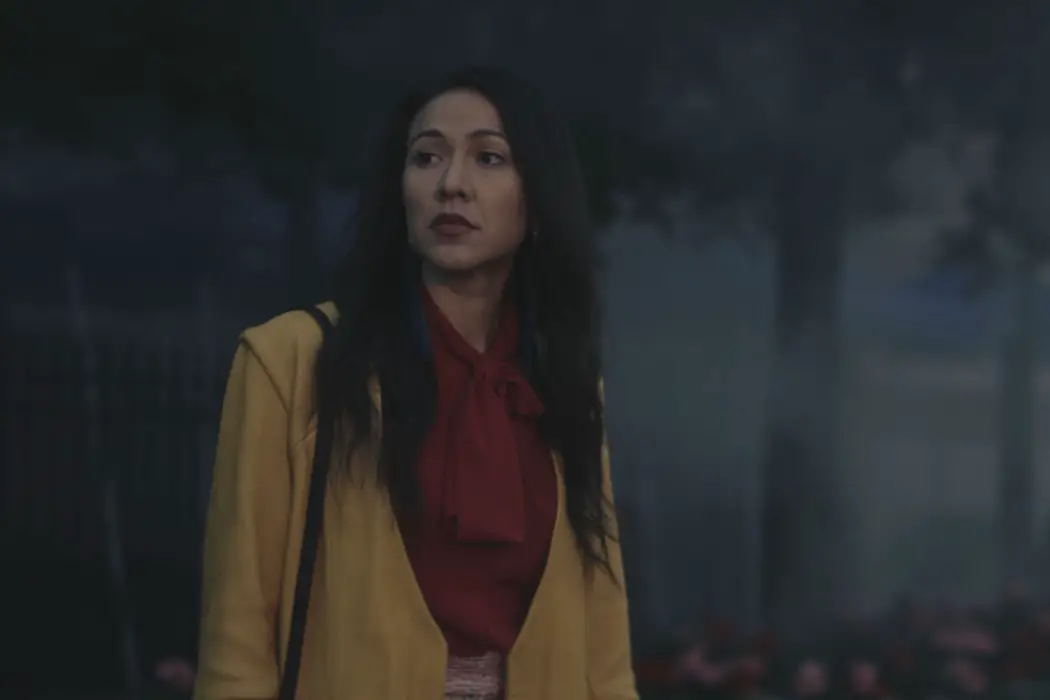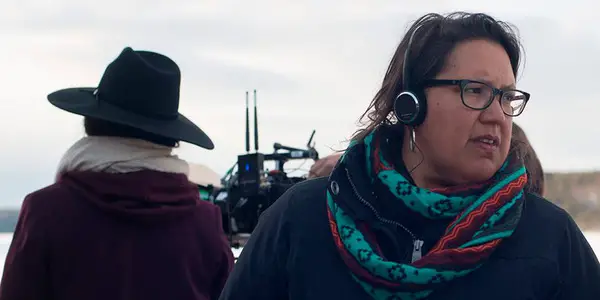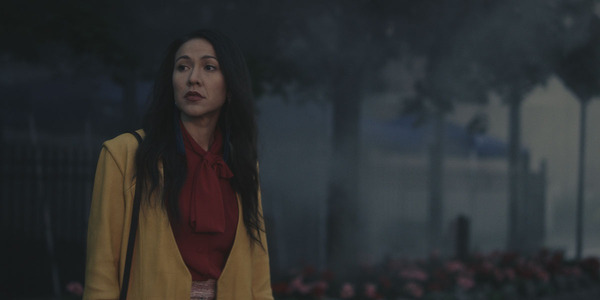Toronto International Film Festival 2022: Interview With Darlene Naponse Of STELLAR

Wilson is a cinema enthusiast based out of Toronto, Canada.…
With sentiments that veer towards experimental, Darlene Naponse‘s Stellar is steeped in deep contemplation as the film traverses its meteorite dreamscape narrative. It’s not the easiest of films to digest, but a thoroughly rewarding experience for those who put in the effort. Naponse spoke to Film Inquiry at this year’s edition of the Toronto International Film Festival, where the film had its world premiere.
Wilson Kwong for Film Inquiry: I know that Stellar is based on a short story that you had written before, so how was it adapting that into a full feature film?
Darlene Naponse: It was interesting because writing is such an isolated thing. And when you start to think about film and how so many other things can be part of it, that was the challenge. I think when you write something and then go to film it, it’s completely different. You try to make it the same, but it’s not. But it still became the same ideas around two people trying to connect, and that idea of touch and love.
So was the idea to always turn this story into a film? Particularly because it’s such a visual piece of storytelling.
Darlene Naponse: Yeah, I think that’s the way I see it. When I wrote it, it was originally just a short story, and I really loved it as a short little story. It was a bit harder and very sexual. But even as a writer, I think I’m always seeing it like a film, so I’m always visualizing it.
Speaking of visuals, my understanding is that a lot of the film was shot on a green screen?

Darlene Naponse: Yes, it was set in a bar, and so we had a set and shot inside of a bar. The window that was outside of that, that’s where all of the green screen happened. And it was very detailed in the way that we did things because it all followed with the meteorite falling. We’re first in a storm, then we go through fire and then water. And we had ourselves little rules, like we were only using certain lenses on certain actors and then there was a colour tone that helped visualize the internal emotions, but also the external storm and impending meteorite hitting Earth.
Can you talk specifically about the colour tone? It plays such a large role in the film.
Darlene Naponse: It was something that me and the cinematographer worked out at the beginning. We didn’t want anything warm, and we knew that we’d see red, but we wouldn’t see green on anything. No one’s costumes or anything had green or yellow, so we stayed away from certain tones. And when we did finally get to that warming part, you were like, “Oh, this is the first time I’ve seen the sun.” The same thing for seeing green for the first time. There was a little part where the trees start growing, but those are little inklings of what is going to happen, so it was very deliberate and thought out. And then during the visual effects through the window, we got to amplify that and really explore creating more emotion through colours.
Before we move away from the imagery of the film, there’s so many shots of nature itself. Can you speak about how you decided on those specific locations?
Darlene Naponse: So I wanted it to very much be the imagery od Northern Ontario, which is where we shot the film. The kind of beauty that we see, but we don’t always look at, like the curling of a bark or the aging mushroom on a tree that’s hardened over the years. And then just the real simplicity of water falling off of a leaf. But when you look at the industrial parts of it, it’s like looking at the scars that are on our Earth. And so within this beauty, there’s also this devastation of all the clear-cutting and all of the processing of the mineral ore. So the mining and logging have always been part of the stories that I create. And because we’re so submersed in a history of mining and logging, that has created a huge obviously industry in the north, but environmentally has also really troubled our waters and our lands. That’s why I wanted to allow those images to help tell that story of them; of their home and reality and remembering the beautiful moments of what they do remember of their home.

And just because the film is so abstract, how did you help prepare Elle-Máijá Tailfeathers and Braeden Clarke for their roles?
Darlene Naponse: I didn’t get a lot of time, and it was COVID, so we met over Zoom and the two of them only had a day together before we started. It was basically an afternoon and we just sat outside and ran through the script. I tried not to tell them too much other than what they read in the script. And so we talked about love, connection and home. We talked in the presence of their character, and I wanted to make space for them to find those characters from that longing and wanting for touch. The surrender of letting somebody into your world and how scary that can be, and also all of the stupidity that comes at you. And so we also talked about colonial history and generational trauma. We talked about how they felt, how they deal with it and what they wanted to bring in to the character.
I also have to ask you about your song choices in the film. There’s just so many great songs in the film.
Darlene Naponse: So I listened to songs from musicians that I’ve always loved, but as I was looking through new playlists, I kept finding these new musicians. And what started happening was I kept finding all these songs that they were singing in their indigenous languages, and became fascinated by that because all the things I filmed, [the actors] were not speaking Ojibwe, they were speaking in their native language and that’s represented in that. And so I really wanted to honour that kind of power that the musicians have in speaking and singing in their language. So I think that was really part of it, but also the complexities and the how diverse all of these musicians are and how amazing they are.
Film Inquiry would like to thank Darlene Naponse for taking the time to speak with us!
Does content like this matter to you?
Become a Member and support film journalism. Unlock access to all of Film Inquiry`s great articles. Join a community of like-minded readers who are passionate about cinema - get access to our private members Network, give back to independent filmmakers, and more.
Wilson is a cinema enthusiast based out of Toronto, Canada. He escapes from his day job by writing random thoughts about cinema on the internet. Although he has a longstanding penchant for Hong Kong cinema, he considers himself to be an advocate for Asian cinema in general. He has been attending the Toronto International Film Festival every year since 2005, and more of his work can be found on his website: www.wilson-kwong.com.













